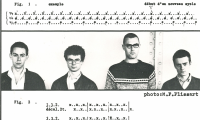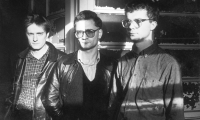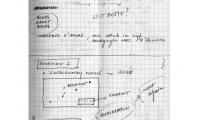WORKS
Thierry De Mey & Peter Vermeersch:
Rosas danst Rosas, 1983
Thierry De Mey & Peter Vermeersch:
Contre-Six, 1984
CAST
Carlo Sampaolesi:
accordion and artistic direction
Maurizio Azzan:
supervision of arrangements
Dirk Descheemaeker: clarinets
Alexandre Fostier: sound
Gerrit Nulens: percussion
Jean-Luc Plouvier: keyboards
Eva Reiter: Paetzold flute, viola da gamba
Nele Tiebout: saxophones
PRODUCTION
Production
Ictus
With the support of
Flemish Community
and the Tax Shelter of the Belgian Federal Government
164VANVOLXEM
OPENING FESTIVAL 30.1 > 22.2.2026
ROSAS + P.A.R.T.S. + ICTUS
Dancingkids / Platform K / workspacebrussels / Dancingkets
February 14 & 15 (doube bill part 1) | Tickets
at Rosas Performance Space, 164 Van Volxemlaan, 1190 Brussels
In 1983, Anne Teresa De Keersmaeker had her international breakthrough with Rosas danst Rosas, a performance that has since become a benchmark in the history of postmodern dance. Rosas danst Rosas builds on the minimalism initiated in Fase (1982): abstract movements constitute the basis of a layered choreographic structure in which repetition plays the lead role.
The music for Rosas danst Rosas was composed in 1983 by Thierry De Mey and Peter Vermeersch, who shortly afterwards founded the sextet 'Maximalist!'. The turbulent history of this sextet later gave rise to the Ictus ensemble in 1994. Maximalist! took on the torch created by the group ‘de Volharding’, founded in 1972 by Louis Andriessen and Willem Breuker: a European neo-minimalism, more aggressive and ‘hotter’ than American repetitive music. Thierry De Mey and Peter Vermeersch brought their own particular flavour to the group: the former with his taste for formalist procedures inspired by Ars Nova, the latter with his affinity for rock and surrealist jazz, from Carla Bley to Frank Zappa.
These two multifaceted talents, so different yet complementary, co-composed Rosas danst Rosas and Contre-Six ‘using four hands’, a very rare phenomenon in the history of written music. One cannot help but think of the famous preface to A Thousand Plateaus by Deleuze and Guattari: "Since each of us was several, there was already quite a crowd"! These are two masterpieces of energy, swing and melodic inventiveness, with a beauty of texture that rivals that of Steve Reich. These pieces have not aged a bit, as they bear witness to a particular moment in time, that of the collective and feverish invention of the ‘Flemish Wave’.
Carlos Sampaolesi leads a contemporary reinterpretation, inspired by Anne Teresa De Keersmaeker's working notes during the choreographic writing of Rosas in Rosas. It will be performed by an ensemble of musicians that also represents the current state of Ictus: three generations of musicians-researchers...
164VANVOLXEM
OPENING FESTIVAL 30.1 > 22.2.2026
ROSAS + P.A.R.T.S. + ICTUS
Dancingkids / Platform K / workspacebrussels / Dancingkets
14 & 15 februari (doube bill part 1) | Tickets
Rosas Performance Space, 164 Van Volxemlaan, 1190 Brussel
In 1983 brak Anne Teresa De Keersmaeker internationaal door met Rosas danst Rosas, een voorstelling die sindsdien een mijlpaal is geworden in de geschiedenis van de postmoderne dans. Rosas danst Rosas bouwt voort op het minimalisme dat in Fase (1982) werd geïntroduceerd: abstracte bewegingen vormen de basis van een gelaagde choreografische structuur waarin herhaling de hoofdrol speelt.
De muziek voor Rosas danst Rosas werd in 1983 gecomponeerd door Thierry De Mey en Peter Vermeersch, die kort daarna het sextet Maximalist! oprichtten. De turbulente geschiedenis van dit sextet leidde later tot de oprichting van het ensemble Ictus in 1994. Maximalist! nam de fakkel over van de groep ‘de Volharding’, die in 1972 werd opgericht door Louis Anadriessen en Willem Breuker: een Europees neominimalisme, agressiever en ‘heter’ dan de Amerikaanse repetitieve muziek. Thierry De Mey en Peter Vermeersch brachten hun eigen specifieke smaak in de groep: de eerste met zijn voorliefde voor formalistische procedures geïnspireerd door Ars Nova, de tweede met zijn affiniteit voor rock en surrealistische jazz, van Carla Bley tot Frank Zappa.
Deze twee veelzijdige talenten, zo verschillend en toch complementair, componeerden samen Rosas danst Rosas en Contre-Six ‘met vier handen’, een zeer zeldzaam fenomeen in de geschiedenis van de geschreven muziek. Men kan niet anders dan denken aan het beroemde voorwoord van A Thousand Plateaus van Deleuze en Guattari: “Aangezien ieder van ons meerdere personen was, was er al een hele menigte”! Het zijn twee meesterwerken van energie, swing en melodische inventiviteit, met een textuur die qua schoonheid niet onderdoet voor die van Steve Reich. Ze zijn geen spat veranderd, omdat ze getuigen van een bepaald moment in de tijd, namelijk dat van de collectieve en koortsachtige inventiviteit van de ‘Vlaamse Golf’.
Carlos Sampaolesi leidt een hedendaagse herinterpretatie, geïnspireerd door de werknotities van Anne Teresa De Keersmaeker tijdens het choreografisch schrijven van Rosas in Rosas. Het wordt uitgevoerd door een ensemble van muzikanten dat ook de huidige staat van Ictus vertegenwoordigt: drie generaties muzikanten-onderzoekers...
164VANVOLXEM
OPENING FESTIVAL 30.1 > 22.2.2026
ROSAS + P.A.R.T.S. + ICTUS
Dancingkids / Platform K / workspacebrussels / Dancingkets
14 & 15 février (doube bill part 1) | Tickets
Rosas Performance Space, 164 avenue Van Volxem, 1190 Bruxelles
En 1983, Anne Teresa De Keersmaeker faisait son entrée sur la scène internationale avec Rosas danst Rosas, un spectacle devenu depuis lors une référence dans l’histoire de la danse postmoderne. Rosas danst Rosas approfondit la veine minimaliste ouverte avec Fase (1982) : des mouvements abstraits constituent la base d’un riche contrepoint chorégraphique dominé par la répétition.
La musique de Rosas danst Rosas a été composée en 1983 par Thierry De Mey et Peter Vermeersch, peu avant qu'ils ne fondent le sextuor « Maximalist! ». L'histoire turbulente de ce sextuor donnera naissance à l'ensemble Ictus en 1994.
Maximalist! reprenait le flambeau du groupe « de Volharding », fondé en 1972 par Louis Andriessen et Willem Breuker : un néo-minimalisme européen, plus agressif, plus hot que la musique répétitive américaine. Thierry De Mey et Peter Vermeersch apportaient chacun leur touche personnelle au groupe : le premier par son goût pour les procédés formalistes inspirés de l'Ars Nova, le second par son affinité avec le rock et le jazz surréaliste, de Carla Bley à Frank Zappa.
Ces deux talents aux multiples facettes, si différents et si complémentaires, co-composèrent « à quatre mains » Rosas danst Rosas et Contre-Six, phénomène très rare dans l'histoire de la musique écrite. Chacun y mit tout ce qu'il savait. On ne peut s'empêcher de penser à la préface célèbre de Mille plateaux de Deleuze et Guattari : « Comme chacun de nous était plusieurs, ça faisait déjà beaucoup de monde » ! Ces deux pièces sont de purs chefs-d'œuvre d'énergie, de swing et d'inventivité mélodique, avec une beauté dans les textures qui n'a rien à envier à celles d'un Steve Reich. Elles n'ont pas pris une ride, dans la mesure où elles continuent de témoigner d'un moment historique singulier, celui de l'invention collective et fiévreuse de la « Flemish wave ».
Carlos Sampaolesi propose une relecture contemporaine, inspirée des notes de travail d'Anne Teresa De Keersmaeker lors de l'écriture chorégraphique de "Rosas in Rosas" Elle sera interprétée par un ensemble de musiciens qui reflète l'état actuel d'Ictus : trois générations de musiciens-chercheurs...
Agenda for this project
- Date Show Location
-
Sat 14.02 164vanvolxem Opening Festival: Maximalist! Rosas-Parts-Ictus site - Forest - Belgium

-
Sun 15.02 164vanvolxem Opening Festival: Maximalist! Rosas-Parts-Ictus site - Forest - Belgium



